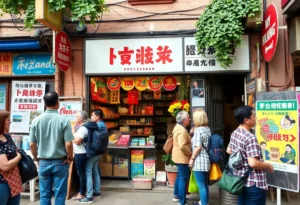Seafood Fraud Lawsuit Against Charleston Restaurants: Protecting Brand Integrity
As the Chief Marketing Officer for a major South Carolina Digital Marketing Company, we work with all sorts of product launches and branding considerations. To put it simply, your brand creates value and, hopefully, instills loyalty. It has never been more important than it is today to protect your brand and to represent clearly exactly what your brand means! The federal lawsuit filed by the South Carolina Shrimpers Association against 40 Charleston-area restaurants on June 13, 2025, for falsely advertising imported shrimp as local, has rocked the Lowcountry’s culinary scene. This “shrimp fraud” scandal, uncovered through genetic testing by SeaD Consulting, threatens the region’s reputation for authentic seafood. Below, we explore the perspectives of key stakeholders—restaurants and shrimpers, consumers, government and regulatory bodies, and the greater Charleston community—while highlighting social media buzz and addressing key concerns in a structured FAQ.
Restaurants and Shrimpers: A Clash Over Authenticity
The South Carolina Shrimpers Association, represented by attorney Gedney Howe IV, accuses 40 unnamed Charleston-area restaurants of violating federal false advertising laws and South Carolina’s Unfair Trade Practices Act by serving imported shrimp while claiming it’s local. Genetic testing by SeaD Consulting, commissioned by the Southern Shrimp Alliance, revealed that 40 of 44 tested restaurants served foreign shrimp, with 25 deemed “outright fraudulent.” Shrimpers argue this undermines their $14.1 million industry, as imported shrimp from countries like India and Vietnam undercuts prices and erodes consumer trust in Lowcountry seafood. The lawsuit seeks an injunction and financial penalties to enforce accountability.
Restaurants, meanwhile, face a branding crisis. Establishments like The Wreck of the Richard and Charlene, which passed the test, emphasize their commitment to local shrimp, reinforcing their authenticity at a June 13 press conference on Shem Creek. Others argue supply chain challenges and cost pressures make sourcing local shrimp difficult, especially with annual landings (1.3–6.8 million pounds) unable to meet Charleston’s demand. The lack of named defendants has left all restaurants under scrutiny, risking reputational damage. From a marketing perspective, restaurants must adopt transparent sourcing to rebuild trust, while shrimpers leverage the lawsuit to strengthen their brand as guardians of Lowcountry heritage.
Consumers: Betrayal and Demand for Transparency
Charleston’s diners, particularly tourists drawn to the city’s seafood reputation, feel betrayed by the revelations. Consumers expect “local” or “Carolina-caught” shrimp to be authentic, especially in a coastal city where shrimp and grits is a culinary staple. Social media posts on X reflect outrage, with many vowing to patronize only verified local seafood providers like the four restaurants—Coosaw Creek Crab Shack, Grace & Grit, Rappahannock Oyster Bar, and Acme Lowcountry Kitchen—confirmed to serve wild-caught shrimp. Some consumers advocate for a state “country-of-origin labeling” law, similar to Louisiana’s, but worry about higher prices if restaurants rely solely on local sources. Marketers must align branding with consumer expectations for authenticity while addressing affordability concerns.
Government and Regulatory Perspective: Enforcing Fair Practices
South Carolina lacks mandatory seafood origin labeling, unlike states like Louisiana, where only 34% of restaurants misrepresent shrimp sources compared to 80% in states without such laws. The lawsuit cites violations of the federal Lanham Act and South Carolina’s Unfair Trade Practices Act, which prohibit knowingly misrepresenting food origins. The Federal Trade Commission (FTC) has warned restaurants against creating a “net impression” of local sourcing when serving imports, deeming it illegal. Charleston’s lawsuit, filed in U.S. District Court, aims to set a precedent, with shrimpers pushing for a state labeling law in the next legislative session. Local lawmakers support the shrimpers, recognizing the economic and cultural value of the industry. Regulators face pressure to enforce transparency while balancing restaurant viability, making this a pivotal moment for policy reform.
Greater Charleston Community: Pride and Economic Stakes
Charleston’s identity as a culinary destination is tied to its seafood heritage, with iconic shrimp boats dotting Shem Creek. The community, including Mount Pleasant and nearby areas, supports the shrimpers’ fight, viewing it as a defense of Lowcountry culture against cheap imports. The lawsuit has sparked pride in establishments like those listed by the Shrimpers Association’s “fresh shrimp locator,” but also concern about tourism impacts if Charleston’s culinary reputation falters. Residents fear higher dining costs if restaurants shift to local shrimp, yet value authenticity. Social media reflects calls for education and transparency to sustain the industry. Marketers must amplify this pride while addressing economic concerns to maintain Charleston’s brand as a seafood haven.
Social Media Buzz: Outrage and Support
Social media, particularly X, has been a key platform for the shrimp fraud controversy, reflecting polarized sentiments:
- @HolyCitySinner (June 19, 2025, 17:49 EDT): “Attorney Gedney M. Howe, IV, who is representing the South Carolina Shrimper’s Association in their lawsuit regarding ‘seafood fraud’ in the state, recently spoke with @QuintinOnCamera #chsnews.” This post highlights the lawsuit’s prominence.
- @postandcourier (June 20, 2025, 13:30 EDT): “Seafood scandal? SC shrimpers sue 40 restaurants for shrimp fraud.” This post, shared widely, underscores public shock.
- @QuintinOnCamera (June 19, 2025, 14:57 EDT): “A federal lawsuit has been filed on behalf of the South Carolina Shrimper’s Association to put an end, as they say, to seafood fraud in the state. #chsnews.” This post amplifies the shrimpers’ call for justice.
- @spectrumnewssc (June 19, 2025, 17:00 EDT): “The SC Shrimper’s Association is suing 40 Lowcountry restaurants for allegedly misleading customers. Here’s what they’re saying.” This post reflects ongoing community engagement.
The X buzz shows strong support for shrimpers but pressure on restaurants to respond transparently, highlighting social media’s role in shaping brand narratives.
Conclusion: Branding Lessons from the Lowcountry
The Charleston seafood fraud lawsuit underscores the critical importance of brand authenticity in a culinary capital. Restaurants, shrimpers, and regulators must collaborate to restore consumer trust through transparency and accountability. Charleston’s proactive response, paired with calls for labeling laws, sets a model for coastal communities. From a marketing standpoint, this controversy teaches that protecting a brand means aligning with cultural values and consumer expectations, ensuring Charleston’s seafood legacy remains a source of pride and trust.
FAQ: Seafood Fraud Lawsuit Against Charleston Restaurants
| Question | Restaurants/Shrimpers | Consumers’ View | Government/Regulatory Stance | Greater Charleston Community |
|---|---|---|---|---|
| What is the seafood fraud lawsuit about? | Shrimpers sue 40 restaurants for falsely advertising imported shrimp as local, seeking injunctions and penalties. Restaurants face trust erosion. | Shocked by deception, demand transparency and authentic seafood. | Laws prohibit false advertising; lawsuit aims to set precedent, push for labeling law. | Supports shrimpers, sees lawsuit as protecting culinary heritage. |
| What are the main issues? | Shrimpers lose market share to cheap imports; restaurants cite supply chain challenges. | Betrayal over false claims; worry about higher prices for local shrimp. | Lack of mandatory labeling; regulators urged to enforce fair trade. | Fears tourism impact, prioritizes preserving seafood culture. |
| Why do restaurants use imported shrimp? | Cost and supply constraints; local landings (1.3–6.8M lbs) can’t meet demand. | Expect local shrimp in coastal city, feel misled by branding. | FTC deems misrepresentation illegal; supports accountability. | Wants local sourcing but understands supply limitations. |
| What’s the economic impact? | Shrimpers aim to reclaim market share; restaurants risk lost sales, higher costs. | Value authenticity but sensitive to price hikes. | Shrimping industry worth $14.1M; regulators weigh trade protections. | Sees tourism boost from authenticity but fears cost increases. |
| How can trust be restored? | Restaurants adopt transparent sourcing; shrimpers promote verified suppliers. | Demand clear menu labeling, support verified restaurants. | Push for labeling law, stricter enforcement. | Calls for education, support for local shrimpers. |
Author: Todd Hunnicutt
Todd Hunnicutt is a dynamic media personality, entrepreneur, coach, and Chief Marketing Officer at Real Internet Sales. Renowned for his technology expertise, he's been featured in the New York Times, National Geographic, and major news outlets. As a nationally syndicated technology writer, Todd is a sought-after voice in marketing, ai, entrepreneurship, and economics, frequently interviewed by industry publications. A proud South Carolina native, he cherishes outdoor adventures, BBQ, Tuesday family dinners, and Sunday church services. A passionate baseball fan, Todd enjoys games alongside his wife, Elizabeth, whose umpire-call critiques rival instant replay. With an extensive background, he's collaborated with Fortune 500 companies, nonprofit startups, and political campaigns. A serial entrepreneur, Todd thrives on innovative ideas and loves hearing a compelling pitch!




